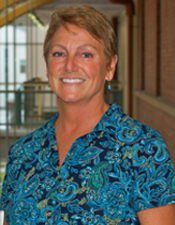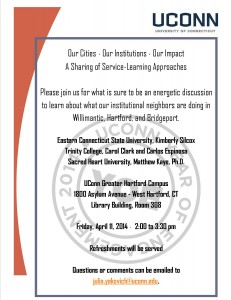The Service Learning Faculty Fellows Program for 2016 is offered through the Office of Public Engagement (OPE). This enhanced fellowship opportunity is designed to intentionally and consistently align with OPE’s philosophy of Relevant, Reciprocal, Responsible community engagement. The fellowship will begin with immersion training in mid-January followed by monthly two-hour workshops during the spring and fall semesters. Faculty who are accepted must commit to teaching a new or existing modified course with service learning as a pedagogy in the fall of 2016. Faculty will receive continued support from the Manager of Service Learning and the Service Learning Committee throughout the fall in addition to a monetary stipend or contribution to their department. Faculty Fellows are expected to mentor their colleagues in service learning as appropriate.
The Service Learning Faculty Fellows Program is open to all faculty on all campuses; whether you have taught with service learning as a pedagogy for years or have never done so. Courses may be undergraduate or graduate, domestic or global.
The Office of Public Engagement and its Service Learning staff support academic and program-focused service learning at the University. OPE is a resource for students, faculty, staff and community partners interested in the pedagogy of Service Learning which “is a teaching and learning strategy that integrates meaningful community service with instruction and reflection to enrich the learning experience, teach civic responsibility and strengthen communities.” – Carnegie Foundation Definition of Service Learning
Please contact Julia Yakovich for assistance prior to submitting your application at julia.yakovich@uconn.edu.
Timeline for Fellow Application
Deadline for submission: Thursday, Oct. 1st
Notification from OPE: Thursday, Oct. 8th
Faculty response to OPE: Thursday, Oct. 15th
Faculty Fellowship Outline of Pedagogical Activities from January to December 2015
January 2016 Intensive Training
January training will focus on building an SL course through a consideration of SL course components: organization, objectives, assignments, assessments, and the community partner relationship.
Faculty will bring with them: syllabus of the course they want to modify or a description of a new course with a list of readings, goals and objectives.
Homework will be posted on HuskyCT before the training. Faculty will be expected to have read all homework on the web before the first day of training. It will include the UConn Service Learning Guidebook, critical articles, history of Service Learning at UConn, and sample syllabi in their discipline.
Faculty Fellow Required Training Schedule
Thursday, January 14 & Friday, January 15 of 2016*
| Day 1 |
Thursday, January 14, 2016 |
| 9:00 to 10:00 |
Introduction to Service Learning: The nuts and bolts of Service Learning |
| 10:00 to 10:30 |
What the research says about Service Learning and its outcomes |
| 10:45 to 12:00 |
Service Learning Course Construction: ‘Goals and Objectives’ |
| 12:30 to 2:20 |
Service Learning Course Construction: ‘Development Techniques’ |
| 2:30 to 3:45 |
Service Learning Course Construction: ‘Assessment’ |
|
Homework for Day 2: Faculty work on altering syllabi for homework on goals and objectives, model of SL, and assessment activities. |
|
|
| Day 2 |
Friday, January 15, 2016 |
| 9:00 to 10:30 |
SL Pedagogy: Overview of development and key ideas, followed by discussion of critical articles |
| 10:45 to 12:00 |
Critical Reflection: How to craft and grade reflective assignments |
| 12:30 to 1:20 |
Sustainable, Ongoing, Mutually Beneficial: Navigating University/Community Partner Relationships |
| 1:30 to 2:30 |
Community Partnerships: Reciprocal Learning and Privilege |
| 2:30 to 3:00 |
Faculty time to continue to revise syllabus, incorporate course ideas from the training. |
| 3:00 to 4:00 |
Faculty present on revised syllabi to previous years faculty fellows. |
|
|
*snow day will be Monday, January 18, 2016
Overview of Workshops
Spring Semester 2016
Spring semester workshops will assist faculty in preparing for their fall course, in addition to deepening faculty understanding of Service Learning pedagogy. Each workshop will include training module, followed by time to discuss critical article or chapter.
February: OSL Policies and Procedures, IRB, Risk in addition to ‘Writing and Service Learning’.
March: Technology and Service Learning.
April: Campus Compact-sponsored presentation of keynote speaker on Service Learning. Current and former faculty fellows process the talk together, discuss ideas and how they connect to courses and research over lunch.
May: Day-long service learning experience in either Willimantic or Hartford focused on a theme. This experience will give faculty the opportunity to have a mini hands-on experience with SL while also talking to partners about how to have successful partnerships.
Fall 2016 Semester
Fall workshops will provide additional training, as well as providing a forum in which faculty can process course teaching, brainstorm, and receive feedback and support.
September: Using Media to get your message out.
October: Community Partner Management and Critical Reflection.
November: Assessment w/ Community Partners. Critical Reflection continued.
December: Writing up the results. A discussion with faculty who have published articles about their SL teaching or research.
Apply for the program here.
Please note: If you would like to explore possible proposals or goals for service learning before submitting this application, please contact Julia Yakovich at julia.yakovich@uconn.edu or at 860.486.4531.
 Service learning projects are developed by connecting student learning objectives and community need. As such, the resulting partnership is mutually beneficial for all parties. The project activities and deliverables can vary widely as service learning can take on many forms.
Service learning projects are developed by connecting student learning objectives and community need. As such, the resulting partnership is mutually beneficial for all parties. The project activities and deliverables can vary widely as service learning can take on many forms.
